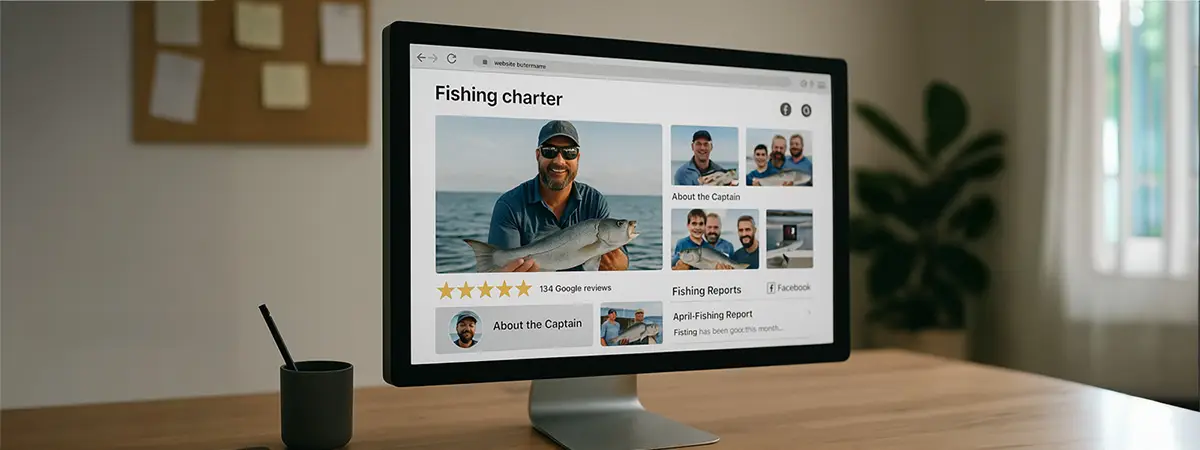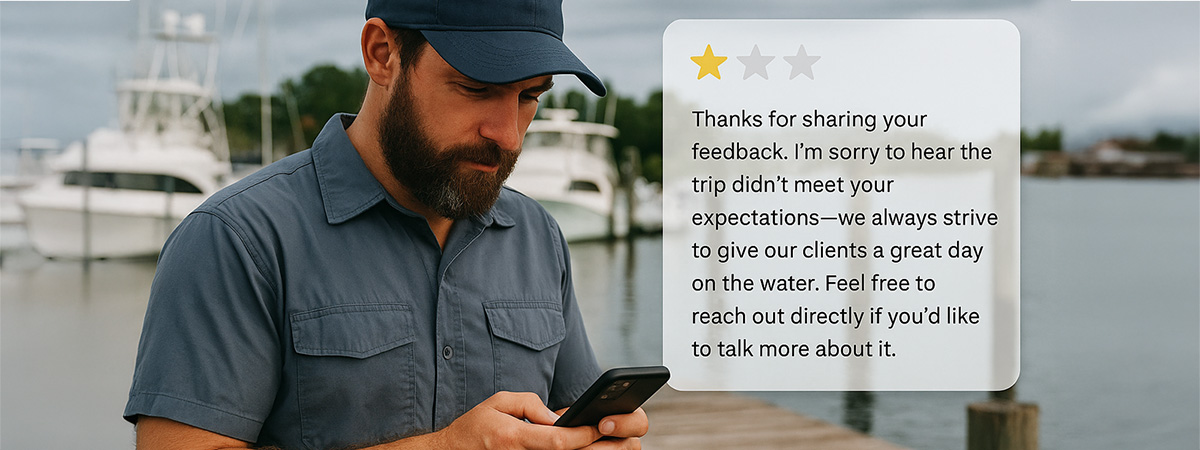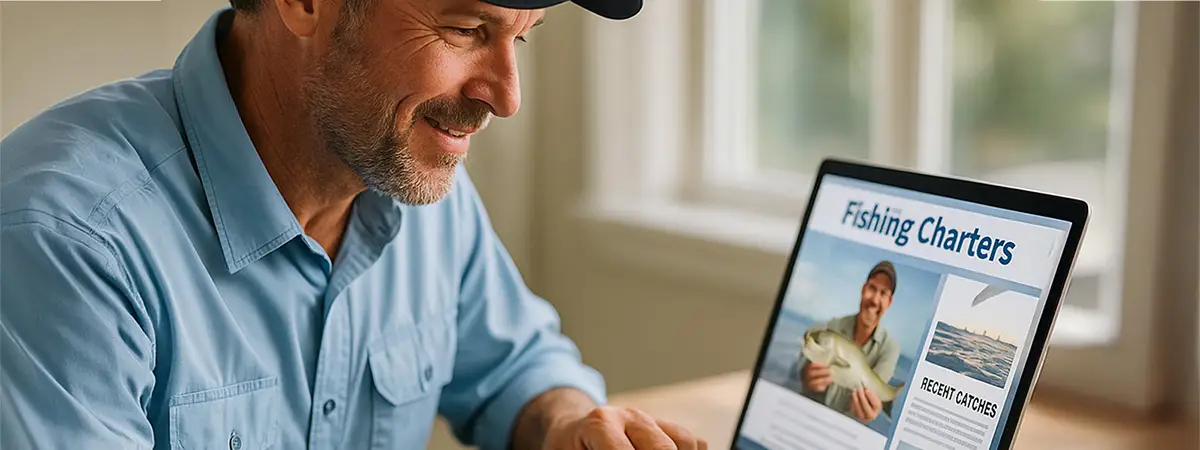Reputation has always mattered in the world of fishing charters & guides. For decades, your name traveled by word of mouth—shared at boat ramps, tackle shops, and over beers at the local bar. But today, that conversation has moved online. Whether someone’s Googling your name, scrolling through TripAdvisor, or checking your social media presence, they’re forming opinions before ever picking up the phone.
For fishing guides and charter captains, your online reputation is often your first impression. And in a competitive market, that impression can make or break a booking. One or two bad reviews—or worse, no presence at all—can raise red flags. But managing your online reputation isn’t just about damage control. It’s about building trust, telling your story, and showing potential clients what kind of experience they can expect on your boat.
Why Your Reputation Now Lives Online

A decade ago, your reputation was built dockside—shared through conversations at the boat ramp or the local bait shop. But today, it’s shaped by what people find about you online. Before anyone picks up the phone, they’re likely typing your name into Google, scanning your reviews on TripAdvisor, or checking your latest photos and posts on Facebook or Instagram.
These digital platforms now play a huge role in the booking process. Google is the gatekeeper, surfacing your business listing, reviews, and website before most people ever see your social content. TripAdvisor is especially influential in tourist-driven markets, often ranking highly in search results for terms like “best fishing charter in [location].”
Even lesser-used platforms like Yelp or travel forums can show up in search results—and while they may not drive much traffic, what’s there can still shape perception. That’s why it’s important to monitor all the places your name appears, not just the ones you use regularly.
Today’s word of mouth lives online. And just like it used to matter what people were saying at the boat ramp, it matters just as much—if not more—what they’re saying on the internet.
More Than Reviews — What Else Defines Your Reputation?

Online reviews might be the most visible piece of your reputation, but they’re only part of the picture. Every digital touchpoint a potential client sees contributes to the story they build about you. That means your reputation isn’t just about what others say—it’s also shaped by what you choose to show (or neglect to update).
An outdated website with broken links or old photos can send the wrong message. A social media page with no activity in months might make someone wonder if you’re still in business. On the flip side, guides who post regularly—even just a quick shot of a happy client or a calm morning on the water—come across as active, engaged, and trustworthy.
Your public interactions matter, too. Comment threads, Facebook groups, and even local forums can become part of your digital footprint. Staying professional—even when you disagree or need to defend your business—shows that you’re serious about your work and respectful toward your audience.
It all adds up: your reviews, your responses, your content, and your consistency. They work together to build (or erode) trust—long before someone ever steps on your boat.
Monitoring Your Name & Business

You can’t manage your reputation if you don’t know what’s being said. That’s why regular monitoring is one of the simplest, most effective habits a charter captain can build. You don’t need fancy tools or a PR team—just a few minutes a week can make a big difference.
Start by searching your own name and business name on Google. What shows up? Are your reviews accurate and up to date? Are there old directories or outdated fishing reports still floating around? Seeing yourself through the eyes of a potential client is the first step to understanding your online footprint.
You can also set up free Google Alerts to be notified when new content mentions your name or business. Just enter your name at google.com/alerts, and you’ll get email updates any time it appears in a news article, blog post, or even forum thread.
And don’t forget to check your main review platforms—Google, TripAdvisor, and Facebook—at least once a week. It’s not just about catching negative reviews; it’s also about staying engaged and responsive with happy clients who take the time to leave feedback.
Responding to Criticism Without Fueling the Fire

No one likes getting a bad review, but how you respond matters more than the review itself. A thoughtful, professional reply can actually build trust with future customers—sometimes even more than a dozen 5-star reviews.
The key is to stay calm, even if the review feels unfair or exaggerated. Avoid getting defensive or argumentative. Instead, thank the reviewer for their feedback, acknowledge their frustration, and offer to make it right if appropriate. Future clients aren’t just reading the review—they’re reading your response, looking for signs of professionalism and accountability.
Here’s a simple formula that works well:
- Thank them for the feedback
- Acknowledge their experience (even if you disagree)
- Share a short explanation or clarification (if needed)
- Invite them to follow up directly
For example:
Thanks for sharing your feedback. I’m sorry to hear the trip didn’t meet your expectations—we always strive to give our clients a great day on the water. Feel free to reach out directly if you’d like to talk more about it.
Resist the urge to “win” the argument. Your goal isn’t to change that person’s mind—it’s to show everyone else that you’re reasonable, respectful, and responsive.
Build a Positive Trail Behind You

A strong online reputation isn’t just about avoiding problems—it’s about creating a steady stream of positive signals that work in your favor. Think of it as leaving a trail that leads future clients right to your boat.
Start by actively showcasing the good stuff. When a client tags you in a post, share it. When someone leaves a glowing review, respond with genuine appreciation. These little interactions show potential customers that you care about your clients and take pride in your work.
You can also take things a step further by building content that supports your reputation. Testimonials on your website, photo galleries, seasonal fishing reports, and even short recap videos from charters all help paint a fuller picture of the experience you provide. And when those materials are kept up to date, they send a powerful message: you’re still here, still busy, and still delivering great trips.
Over time, all of this builds momentum. The more positive content and engagement you generate, the more one-off negative moments fade into the background—and the more confidence future guests will have when they choose to fish with you.
Reputation Is a Long Game
Your online reputation isn’t built overnight. It takes time, consistency, and care—just like building a successful charter business. One bad review won’t sink you, and one great season won’t carry you forever. What matters most is how you show up day after day, both on the water and online.
The good news? You don’t need to be perfect. You just need to be present, professional, and proactive. Respond with respect. Share the wins. Learn from the bumps. Over time, your reputation will speak for itself—and that reputation is often the deciding factor for whether someone chooses to fish with you or keeps scrolling.